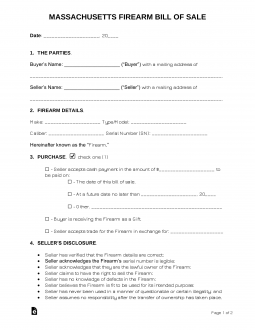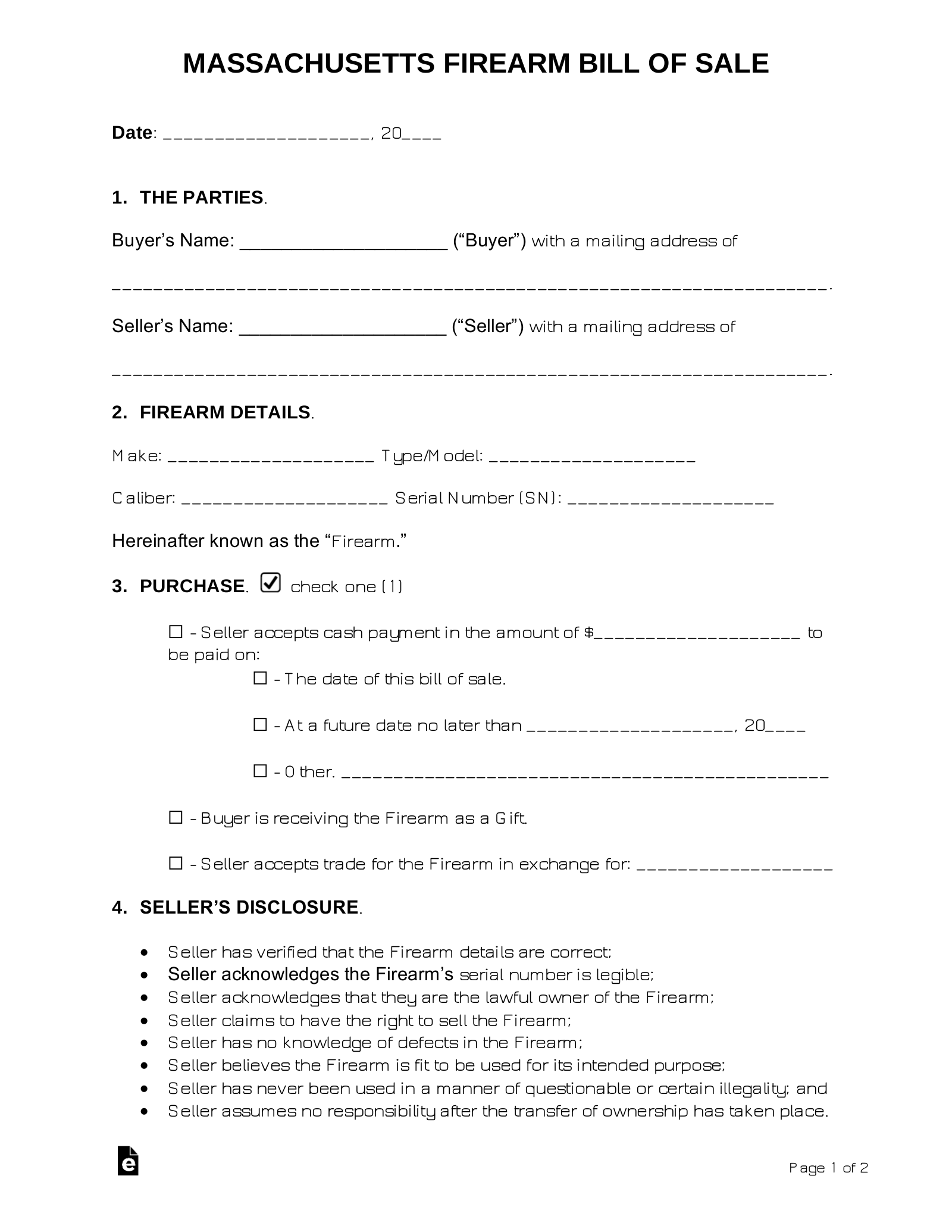Updated September 18, 2023
A Massachusetts gun bill of sale is a legal document that provides evidence of a legal sale, purchase, or trade of a firearm in the State of Massachusetts. The form establishes a formal change of ownership and includes identifying information about the buyer, seller, and firearm. It requires signatures from the buyer, seller, and two (2) witnesses in the presence of a notary public.
Table of Contents |
Privately Selling a Firearm
Only those with a Firearms Dealer License may sell a firearm in the state.[1]
Prohibited from Buying
Anyone who wants to purchase a firearm in Massachusetts must first obtain a Firearms Identification Card from their municipal police department. An individual is prohibited from purchasing or owning a firearm if that person:[2]
- has ever, in a court of the commonwealth, been convicted or adjudicated a youthful offender or delinquent child,[3] for the commission of: (A) a felony; (B) a misdemeanor punishable by imprisonment for more than 2 years; (C) a violent crime as defined in section 121; (D) a violation of any law regulating the use, possession, ownership, transfer, purchase, sale, lease, rental, receipt or transportation of weapons or ammunition for which a term of imprisonment may be imposed; (E) a violation of any law regulating the use, possession or sale of controlled substances,[4] or (F) a misdemeanor crime of domestic violence;[5] provided, however, that, except for the commission of a felony, a misdemeanor crime of domestic violence, a violent crime or a crime involving the trafficking of controlled substances, if the applicant has been so convicted or adjudicated or released from confinement, probation or parole supervision for such conviction or adjudication, whichever occurs last, for 5 or more years immediately preceding such application, then the applicant’s right or ability to possess a non-large capacity rifle or shotgun shall be deemed restored in the commonwealth with respect to such conviction or adjudication and that conviction or adjudication shall not disqualify the applicant for a firearm identification card;
- has, in any other state or federal jurisdiction, been convicted or adjudicated a youthful offender or delinquent child for the commission of: (A) a felony; (B) a misdemeanor punishable by imprisonment for more than 2 years; (C) a violent crime as defined in section 121; (D) a violation of any law regulating the use, possession, ownership, transfer, purchase, sale, lease, rental, receipt or transportation of weapons or ammunition for which a term of imprisonment may be imposed; (E) a violation of any law regulating the use, possession or sale of controlled substances; or (F) a misdemeanor crime of domestic violence;[5] provided, however, that, except for the commission of felony, a misdemeanor crime of domestic violence, a violent crime or a crime involving the trafficking of weapons or controlled substances, if the applicant has been so convicted or adjudicated or released from confinement, probation or parole supervision for such conviction or adjudication, whichever occurs last, for 5 or more years immediately preceding such application and the applicant’s right or ability to possess a rifle or shotgun has been fully restored in the jurisdiction wherein the conviction or adjudication was entered, then the conviction or adjudication shall not disqualify such applicant for a firearm identification card;
- is or has been: (A) except in the case of a commitment,[6] committed to any hospital or institution for mental illness, alcohol or substance abuse, unless after 5 years from the date of the confinement, the applicant submits with the application an affidavit of a licensed physician or clinical psychologist attesting that such physician or psychologist is familiar with the applicant’s mental illness, alcohol or substance abuse and that in the physician’s or psychologist’s opinion the applicant is not disabled by a mental illness, alcohol or substance abuse in a manner that should prevent the applicant from possessing a firearm, rifle or shotgun; (B) committed by an order of a court to any hospital or institution for mental illness, unless the applicant was granted a petition for relief of the court’s order[7] and submits a copy of the order for relief with the application; (C) subject to an order of the probate court appointing a guardian or conservator for a incapacitated person on the grounds that that applicant lacks the mental capacity to contract or manage affairs, unless the applicant was granted a petition for relief[8] and submits a copy of the order for relief with the application; or (D) found to be a person with an alcohol use disorder or substance use disorder or both and committed,[6] unless the applicant was granted a petition for relief of the court’s order and submits a copy of the order for relief with the application;
- is at the time of the application younger than 14 years of age; provided however that the applicant shall not be issued the card until the applicant reaches the age of 15.
- is at the time of the application more than 14 but less than 18 years of age, unless the applicant submits with the application a certificate of a parent or guardian granting the applicant permission to apply for a card;
- is an alien who does not maintain lawful permanent residency;
- is currently subject to: (A) an order for suspension or surrender issued[9] or a similar order issued by another jurisdiction; (B) a permanent or temporary protection order,[10] a similar order issued by another jurisdiction, including an order described in 18 U.S.C. 922(g)(8); or (C) an extreme risk protection order issued,[11] or a similar order issued by another jurisdiction;
- is currently the subject of an outstanding arrest warrant in any state or federal jurisdiction;
- has been discharged from the armed forces of the United States under dishonorable conditions;
- is a fugitive from justice; or
- having been a citizen of the United States, has renounced that citizenship.
Registering a Firearm
Massachusetts does not have any laws requiring owners of firearms to register their weapons with the state.
Concealed Carry
In order to carry a concealed weapon in Massachusetts, a resident must first obtain a License to Carry (LTC).
How to Apply
A person must be at least twenty-one (21) years old to apply for a License to Carry.
Step 1 – Complete a firearms safety training course.[12]
Step 2 – Contact the applicant’s local police department to submit an application.
Reciprocity
Massachusetts does not recognize any state’s concealed carry permits.[13] However, any nonresident of Massachusetts can apply for a temporary license from the Firearms Records Bureau in order to carry a concealed weapon in the state.


